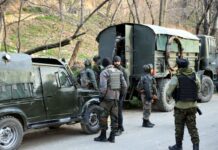Srinagar
Right to internet is also a part of freedom of speech and expression and an indefinite ban on Internet is abuse of power, the Supreme Court said today in a landmark verdict, ordering the Jammu and Kashmir administration to review within one week all restrictive orders in place since the end of special status in August, reported NDTV.
“Suspension of free movement, Internet and basic freedoms cannot be an arbitrary exercise of power,” NDTV quoted the court as saying, asserting that “mere expression of dissent or disagreement against a government decision cannot be reason for Internet suspension.”
The court said all restrictive orders in Jammu and Kashmir put out over the past five months following the scrapping of provisions of Article 370 are to be made public so they can be challenged legally.
As part of the curbs, several political leaders including three former chief ministers have been in detention since August 5.”Suspending internet should be reviewed forthwith. Such suspension can only be for a limited time period and is subject to judicial review,” the Supreme Court said on petitions challenging the restrictions in Jammu and Kashmir.
Justice NV Ramana, reading out the judgement, said, “Freedom of speech and expression includes the right to the internet within Article 19”.
The test of proportionality needs to be satisfied, he said. “This freedom can only be restricted after relevant factors are considered and only if there are no other options,” the judge said.
The court also criticized the repeated use of Section 144, a colonial-era rule to ban large gatherings, in the former state that was bifurcated into two union territories as part of the government’s decision to scrap Article 370. “It can’t be used as a tool to oppress difference of opinion,” the judges said.
“Our limited concern is to find a balance regarding security and liberty of people. We only here to ensure citizens are provided their rights. We will not delve into the political intent behind the orders given,” said Justice Ramana, beginning by quoting from Charles Dickens’ “A Tale of Two Cities”.
The three-judge bench that also includes Justice R Subhash Reddy and Justice BR Gavai had reserved its judgement on November 27.
The centre had justified restrictions imposed in Jammu and Kashmir after the provisions of Article 370 were removed and said that due to the preventive steps taken, neither a single life was lost nor a single bullet was fired.
Besides Congress leader Ghulam Nabi Azad, the top court had heard the petitions filed by Anuradha Bhasin, Executive Editor of Kashmir Times, and others questioning restrictions in Kashmir reported NDTV.














